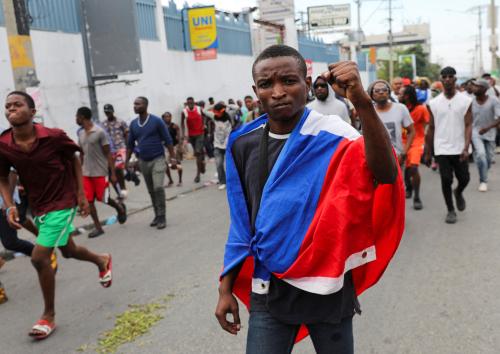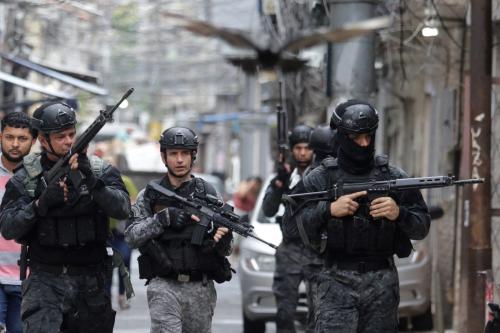

8:30 am EST - 5:30 pm EST
Past Event
On March 4, 2008, the Brookings Institution’s project on “U.S. Policy toward a Cuba in Transition” hosted its second simulation exercise, focusing on the internal dynamics, motivations, and decision-making processes of Cuba’s leadership. With the date of the meeting following on the heels of Fidel Castro’s decision to formally step down from power, the exercise called on participants to put themselves in the shoes of an inner circle of advisers to Raul Castro as they meet to assess possible political and economic strategies for the next five years. While participants were not asked to directly assume the role of known officials, this simulation provided important insights into the institutions and issues affecting Cuba’s future. Such an understanding is crucial in crafting a more effective U.S. policy that supports a democratic Cuba where Cubans define their country’s future.
This brief summary endeavors to capture the dynamics of the simulation exercise itself. Thus, the following pages highlight critical issues and rationales for action as described by participants speaking “in role” as Raul Castro’s closest advisers. Bracketed insets signal important developments on the island since the date of the simulation exercise that either confirm or challenge the group’s discussion of a given issue. The conclusion then steps “out of role” to consider several important analytical lessons from the day’s discussions. Throughout, text in italics denotes key conclusions and fulcrum points, both for U.S. and Cuban policymakers.
Preliminary Assessment:
Raul’s close group of advisers unanimously agreed that their top priority would be to preserve power and continue the Cuban Revolution. To succeed without the charismatic and domineering Fidel Castro, however, they advised Cuba’s new president to build on his reputation as a consensus builder, a pragmatist, and a “doer” rather than a “talker.” Advisers concluded that addressing Cubans’ demands for improved economic conditions without seriously undercutting the authority of the state will be the fundamental challenge for the Raul Castro government. Indeed, according to several advisers, Raul had already raised expectations for change to dangerous levels.
Importantly, advisers expressed full confidence in the loyalty of officials from the top ranks of government, Communist Party, and military bureaucracies. After widespread speculation abroad that Carlos Lage would be promoted to 1st Vice President and usher in an era of rapid change, advisers applauded the appointment of José Ramón Machado Ventura to this position as an important signal of Raul’s intent to preserve control and order even as his government tentatively undertakes reforms.
Key Fulcrum Points:
The Institutions of Government:
Moving to a discussion of institutional capacities, Raul’s inner circle of advisers conceded that the Council of State holds mostly symbolic power. To further consolidate his rule, advisers recommended that Raul mobilize the Cuban Communist Party (PCC) and the Revolutionary Armed Forces (FAR), Cuba’s two strongest government institutions, as vehicles to disseminate, explain, and enforce the decisions of the Cuban hierarchy. This imperative is all the more important, they argued, in the absence of Fidel’s charismatic authority.
The Cuban Communist Party (PCC):
The Revolutionary Armed Forces (FAR):
The Economy
Advisers noted Raul’s likely willingness to broaden Cubans’ economic freedoms to some degree. Yet it was unclear what types of reforms would be most appropriate in light of the leadership’s desire to preserve the fundamentally socialist character of Cuban society. Reforms that remove some onerous restrictions on economic and social activity without dramatically altering economic livelihoods were deemed to be relatively safe. [In the weeks following this simulation exercise, the Cuban government seemed to follow this path by removing restrictions on the purchase of several high-tech devices, raising wage caps for certain professions, and granting Cubans equal access to tourist/hotel facilities].
Advisers considered agriculture to be a prime target for early reforms. [At the time of our exercise, Raul had already given several indications that his government would make a priority of increasing agricultural output and reducing the island’s dependence on imported food products – especially important as global food prices reach alarming highs. Since the date of the simulation, Cuban officials have leased lands to private farmers and decentralized distribution networks, among other steps to increase productivity.] Several advisers felt a logical next step would be to revive and strengthen reforms from the early 1990s that permitted farmers markets, certain small businesses, and other forms of private economic activity – especially in urban areas. Others were more cautious, pointing out that these reforms, if taken too far, could lead to a slippery slope of rising expectations and burgeoning economic clout, with somewhat unpredictable consequences.
This discussion highlighted the difficulty of expanding and continuing the reform process. Some worried that the regime could only fulfill the Cuban people’s significantly expanded expectations for change if it were prepared to undertake major structural reforms and allow citizens to build their own economic lives independently of the government. Most, however, felt it would be better to expand economic opportunity and productivity slowly without inviting strong economic dislocations or undermining the social achievements of the Revolution.
The currency question brought these concerns into stark relief. While all advisers agreed that unifying the currency would address one of Cuban citizens’ chief economic grievances, many demanded assurances that such a policy would not further undermine living standards or threaten state social services. [Recently released internal memos sent from the Cuban Central Bank to the PCC confirm that Cuban official will address the currency issue in stages.] Advisers urged that Cuba’s export-oriented industries – particularly in primary products such as oil and nickel, but also tourism – be diversified and more open to foreign investments. Many hoped that with proper management and an appropriate investment climate, Cuba would develop enough off-shore oil and sugarcane ethanol resources to become energy self-sufficient.
Participants also considered the ideological implications of any number of these economic reforms. If greater consumerism becomes permissible, and if officials endeavor to incentivize production [whether by reducing wage caps, decentralizing agricultural production, or more fundamental structural reforms], will the government be seen as abandoning its historic commitment to egalitarian socialism? Advisers viewed this difficult question as a potential vulnerability.
[Another interesting reform to occur following the date of this meeting relates to property. On April 11, Cuban authorities announced that they would speed up the transfer of private titles to many Cuban citizens for their state-owned homes, leading to much speculation about further liberalization in the housing market.]
The International Community
Raul Castro’s close advisers felt confident that Cuba generally enjoys a favorable international position thanks to generous oil subsidies from Venezuela, high commodity prices in recent years [although nickel prices have significantly declined from a year ago], and the prospect of developing its own oil resources. Participants thus advised Raul Castro to proceed cautiously in improving Cuba’s relationship with the United States. Despite the prospect of gaining access to the U.S. market, the potential costs of such a monumental diplomatic shift – open flows of communication and people – could weaken the regime’s control.
A critical calculation in Cuba’s foreign (and domestic) policy choices will be the status of the island’s energy resources. If Cuba’s own oil reserves and sugar cane ethanol capacity are developed in the next five years, both industries could contribute on the order of $3-5 billion annually in commercial revenues. Such flows would clearly give Cuba new foreign policy choices, namely the prospect of eliminating the island’s dependence on Venezuela. Although advisers agreed that this is an important goal (especially in light of Venezuela’s own economic uncertainties), they also urged Cuba to proceed cautiously. As long as Cuba maintains only a seventeen day supply of crude oil in reserve, Cuba must do nothing to jeopardize its ties to Venezuela.
Advisers positively noted the considerable sympathy of many international partners towards Raul Castro’s reform efforts. Advisers expressed support for Cuba’s expanding ties with Russia, Mexico, and Brazil while also praising Spain’s efforts to convince the European Union to restore normal relations.
Conclusion: Stepping Out of Role
A number of important insights surfaced during the course of this simulation exercise. Participants did not find that domestic or international conditions credibly threaten Raul Castro’s hold on power in the short run. Moreover, it is unlikely that Raul will feel pressure for democratization during his first years of rule beyond a call for broadening voices and perspectives within the PCC. On balance, participants saw Cuba moving toward a model of patrimonial authoritarianism, where economic opportunity expands, but political power and critical economic decision-making authority remains concentrated in the hands of the state. Raul will govern from an institutional rather than a personal base, and his operating mode will be calculated pragmatism to keep this base in power.
The group struggled most with tradeoffs on economic policy. Participants felt that the Raul Castro government recognizes the profound need to address Cubans’ demands for improved economic conditions in order to retain power. Yet there was significant debate over how the Cuban government would seek to address this problem while maintaining its own authority. Although the pace of natural resource exploitation remains unknown, earnings in these sectors could offer a big boost in the future. Indeed, if oil and ethanol do provide significant injections into Cuba’s macro accounts before other structural reforms are undertaken or contemplated, such a resource boost might strengthen central control over the economy and diminish pressure for grassroots reforms. Moreover, the development of energy resources will reduce Cuba’s dependence on Venezuela, while limiting the ability of the U.S. government to use economic sanctions to influence developments on the island.
In the coming years, U.S. policymakers are likely to face a Raul Castro regime that is wiling to “liberalize within bounds” as long as doing so does not risk its own control. Simultaneously, the United States will have increasingly less influence in Cuba as the island develops its energy resources and expands its economic and political relations abroad, particularly within Latin America and with Europe . The key question for U.S. policymakers then is whether there is sufficient confidence in the power of even partial economic reforms to create pressures for reform in other areas. If so, the opportunity may be ripe to assist the likely but sporadic openings Raul will offer, in effect testing whether greater economic freedom and liberalization can indeed build pressure for democratization. The international community already seems prepared take up this gamble and engage with the Raul Castro government – especially in the development of energy resources – even if there is no up-front commitment to fundamental political reform. Whether the United States follows their lead is a decision that will fall to the next President and Congress of the United States.

Eswar Prasad, Caroline Smiltneks
April 14, 2024

Sophie Rutenbar
February 6, 2024

Valerie Wirtschafter
January 24, 2024